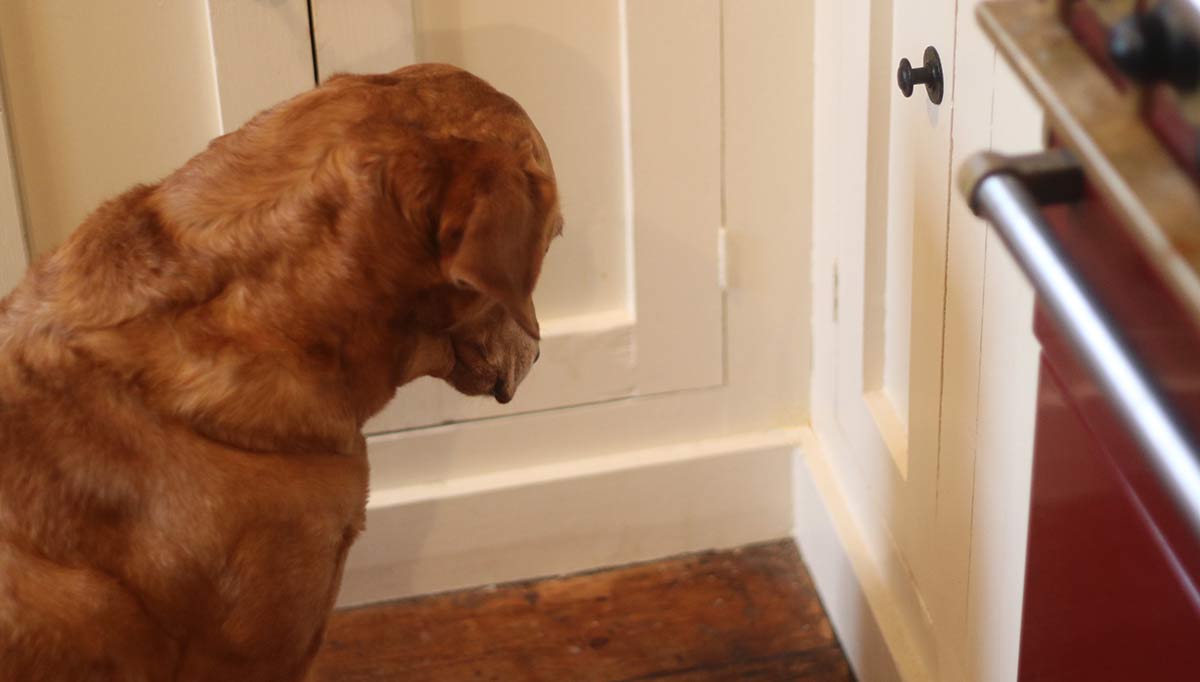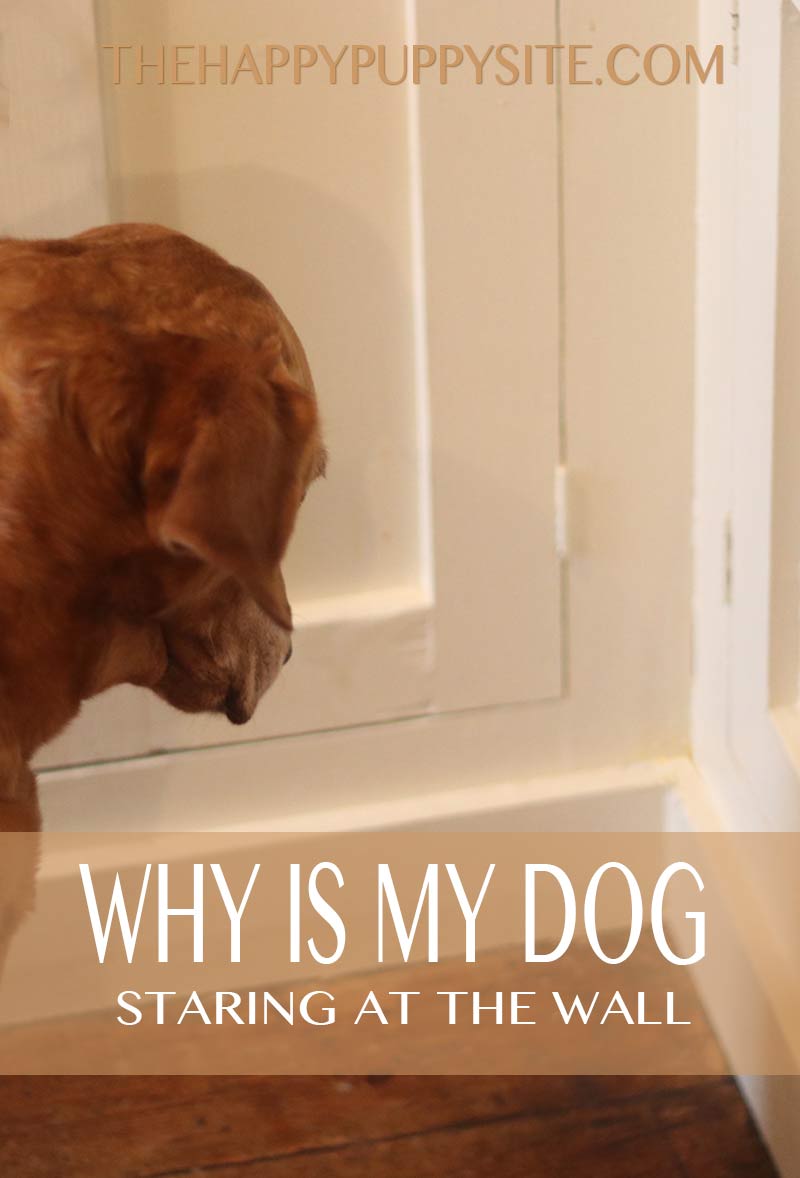What Does It Mean When Dogs Stare at the Wall

Has your dog been behaving differently lately? Has he been gazing off into space, seemingly looking at nothing or facing a blank surface? In 'Why is my dog staring at the wall' we are going to take a look at potential reasons behind this behavior.
A dog staring at the wall, gazing into a corner, or 'into space' on occasion isn't a concern for dog owners.
However, if the dog sits facing the wall all of the time or the dog has his head against the wall, that's not normal behavior.
If it's an elderly dog staring at the wall, dog dementia is a possibility that needs to be considered.
If you have dog staring at wall problems, then it's understandable for you to be concerned about his welfare.
Let's begin our investigations by looking at a similar behavior, but one that requires more immediate action. Head pressing in dogs.
Head pressing in dogs
If you notice your dog's head against the wall, the behavior should strike you as strange.
![]()
- A Complete Guide To Dog Depression
I am afraid that the action of a dog head pressing usually indicates something is wrong with your pet. The same holds true of a dog walking into walls or a dog running into wall or doors.
Dog head pressing is a sign of various canine conditions. Among them are brain tumors, head trauma, encephalitis, nervous system infection, exposure to toxins or poisons and metabolic issues. Dog head pressing may also result from a vascular accident, better known as a stroke.
Having a stroke is not as common in canines as in people, but there are risk factors for dogs. These include metabolic issues such as Cushing's disease or kidney failure. If your female dog receives Prion or phenylpropanolamine for incontinence, she is at a higher risk for stroke. In fact, this drug is no longer available for human use due to the stroke risk.
Head pressing is an emergency
Take your dog to the nearest veterinary emergency hospital immediately if you see him or her doing it.
Diagnostic testing is necessary to get to the bottom of your dog's head pressing to devise the best treatment plan.
The diagnostic tests for head pressing in dogs include blood tests, blood pressure levels and a urinalysis.
The veterinarian will likely have the dog undergo an MRI.
An examination of the dog's eyes is also conducted.
Prosencephalon disease in dogs
A dog head pressing may have prosencephalon disease, a brain disorder. This disease affects the canine thalamus and forebrain. The thalamus regulates activity and sensory information, while the forebrain – the prosencephalon – makes up the largest part of the brain.
Head pressing in dogs is just one symptom of prosencephalon disease.
Other symptoms include seizures, trouble seeing and no longer responding to well-known training cues. If the dog also starts circling or compulsively pacing, suspect prosencephalon disease.
For some dogs, a diagnosis of prosencephalon disease probably means euthanasia is the best option. Other dogs may respond to aggressive treatment. Your veterinarian will advise you of the alternatives for your pet.
If treatment is an option, it may consist of surgery and/or drug therapy. Your dog may need to see a veterinary neurology specialist. Dietary and management changes are also likely for your dog.
But what if your dog isn't pressing his head against the wall, he is simply staring blankly at it?
Dog dementia
Just like people, elderly dogs can develop dementia. The term used is canine cognitive dysfunction syndrome, or CDS. A dog staring at the wall or a dog staring at nothing are symptoms of this disorder.

Dogs with CDS may appear disoriented, getting lost in familiar surroundings. Affected dogs may wander about the house or yard aimlessly. The dog may wander into a corner or behind furniture and seem "stuck."
Dogs suffering from dementia may forget their house training. The dog may want to go outdoors to relieve himself, but then seem to forget why he is there. However, it is worth remembering that although starting to urinate or defecate indoors may indicate a mental issue, it can also have a physical cause.
Humans with dementia may not recognize beloved family members. Canines with dementia may exhibit the same trait. Not only does the dog not recognize his people, but he may not respond to his name, even if you know he can still hear.
If you are concerned your dog might have dementia, then take him for a check up. Your veterinarian will perform a physical examination on the dog, along with diagnostic testing to rule out underlying medical conditions. Fortunately, there is medication available for dog dementia. It eases many of the symptoms and improves the quality of life for you and your pet.
Do you have a depressed dog?
If your dog sits facing wall day after day, he may suffer from depression. Again, the symptoms of canine depression aren't that different from those afflicting humans. Look for less activity, withdrawal from people and personality changes.
It's not just a dog facing the wall that indicates depression. Other symptoms indicative of a depressed dog include excessive licking and chewing, changes in sleeping and eating habits and the loss of interest in activities they once enjoyed.
If your dog no longer gets excited about the prospect of a walk or car ride, something is wrong. Canine depression can result from physical issues, so take your pet to the vet for an examination.
Causes of depression in dogs aren't always obvious, but sometimes they aren't hard to figure out. The loss of an owner, family member or another pet in the household may cause depression. Any significant change – such as moving to a new home or a schedule leaving less time for Fido- may trigger depression.
Depending on the diagnosis, behavioral therapy may help your dog get back into his groove. Medication, including the types of antidepressants used to help people, also lifts the spirits of canines. Yes, depressed dogs may have Prozac or Paxil prescribed, and these drugs may make all the difference in your dog's mood.
Vestibular disease in dogs
If you find your dog running into a wall along with other odd symptoms, he could have vestibular disease. The vestibular system maintains balance. When it is out of whack, all sorts of things go awry. The condition is so common it has earned the moniker, "old dog's disease."
Besides disorientation, symptoms of vestibular disease include head tilt and balance loss. The eyes start jerking, a condition known as nystagmus. Overall, it's a scary scenario.
Vestibular disease may result from ear infections, injury, tumors or diseases such as hypothyroidism. The majority of cases have no known cause. These are referred to as "idiopathic canine vestibular disease."

The veterinarian performs a clinical evaluation of the dog. Blood and urine is taken for testing. If a tumor is suspected, an MRI is scheduled.
Treatment depends on the diagnosis. A dog with a middle ear infection receives antibiotics. Sedation may help dogs running into walls or falling over.
But try not to panic, as there's good news about most cases of vestibular disease.
The majority of dogs recover within a few weeks, as long a tumor or life-threatening disorder wasn't the cause. Once recovered, dogs are back to normal, although some may retain a head tilt.
My Dog Is Staring At The Wall Or Head Pressing
If your dog is staring at the wall there are a number of possible reasons why, ranging from dog dementia to dog depression.
But a dog head pressing is an even more serious matter.
Head pressing in dogs doesn't need to literally mean a "dog head against wall." The dog may head press into any solid object. The same holds true for a dog staring at a wall – it could involve a dog staring at nothing.
Knowing that this is a neurological problem allows you to take quick action and possibly save your dog's life.

References and Further Reading
- Gruen, ME. DVM, MVPH, DACVB. Cognitive Dysfunction. North Carolina State University
- Landsberg, GM. Behavioral Problems of Dogs. Normal Social Behavior and Behavioral Problems of Domestic Animals. MSD Manual.
- Vascular Accident In The Brain. Mar Vista Animal Medical Center.
- Vestibular Disease in Dogs and Cats. Vestibular Disorders Association.

What Does It Mean When Dogs Stare at the Wall
Source: https://thehappypuppysite.com/dog-staring-at-the-wall/
0 Response to "What Does It Mean When Dogs Stare at the Wall"
Post a Comment